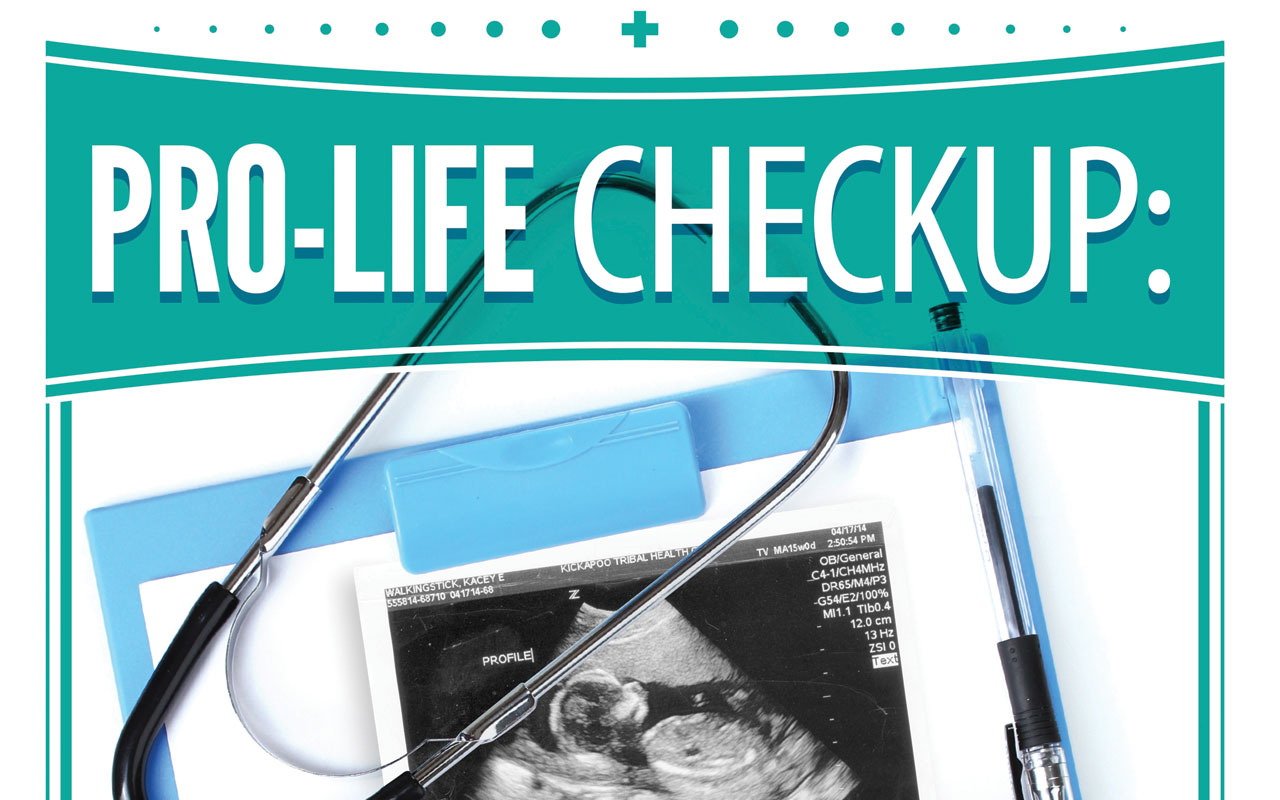Since the 1973 infamous Roe v. Wade Supreme Court decision that mandated legal abortion in America, tens of millions of unborn children have lost their lives to abortion. In Oklahoma, from 2002 to 2014 alone, there were 74,708 induced abortions, as reported by the Oklahoma State Department of Health. This averages 5,852 abortions per year.
The rate of annual abortions in prior years was even higher (see chart below). The Guttmacher Institute reported five distinct years during the 1980s in which there were 12,000 abortions.
In the face of Roe v. Wade, an abortion-on-demand culture and other obstacles, many faith-based groups and Christians have worked to protect the unborn and help women amid an unplanned pregnancy in a variety of ways.
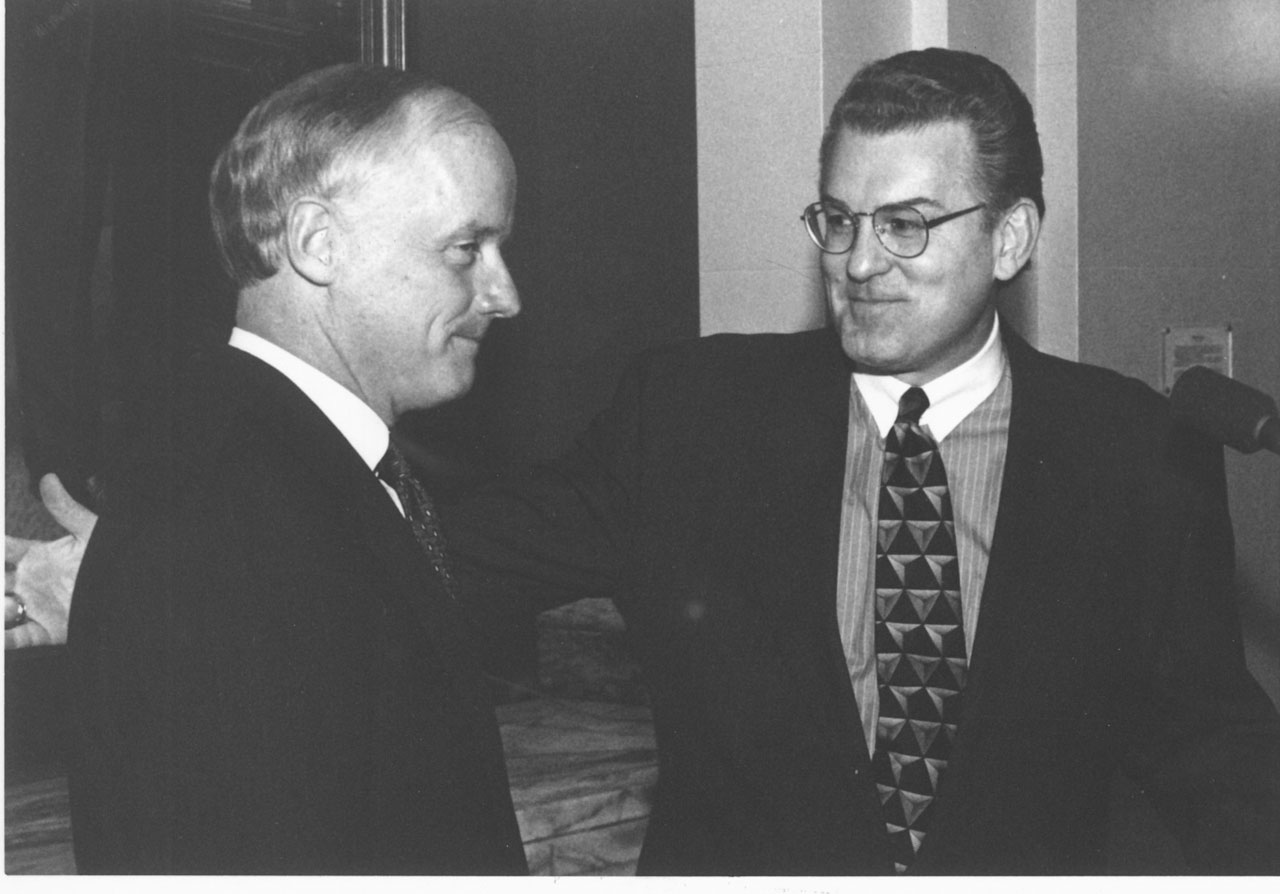
Former Oklahoma Gov. Frank Keating meets with BGCO Executive Director-Treasurer Anthony Jordan, then pastor of Oklahoma City, Northwest, during the 1995 Rose Day Rally.
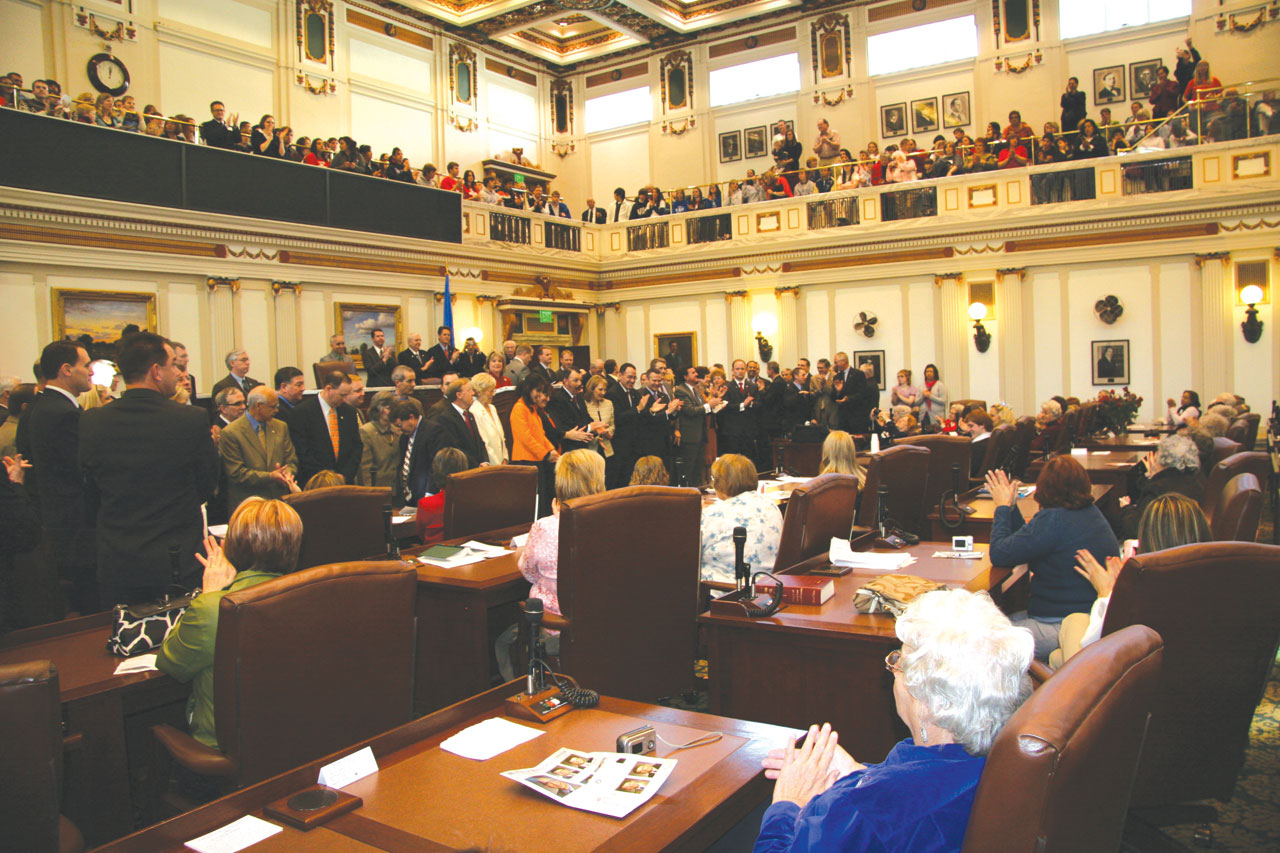
Throughout the years, Rose Day has been a popular event at the State Capitol and has influenced the passage of many pro-life laws.
Pro-Life Events
The annual Rose Day Pro-Life Rally at the Oklahoma State Capitol has become the signature event of the faith-based, pro-life movement in Oklahoma, which has seen successes and challenges in its decades-long history.
Established by a small Catholic group, Rose Day participants offered red roses and a note to elected officials in the state, encouraging them to make policies that protect the unborn from abortion. During the 1980s and 1990s, evangelical Christian groups and citizens became more convinced of the biblical mandate to protect unborn life and became involved.
In 1990, Anthony L. Jordan, then pastor of Oklahoma City, Northwest, chaired the first-of-its-kind major pro-life rally on the steps of the Oklahoma State Capitol. Television reporter Connie Chung was quoted to say some 20,000 attended the rally.
Jordan, who currently serves as the executive director-treasurer of the Baptist General Convention of Oklahoma (BGCO), was thrilled with the success but recognized that the event, which happened on a Sunday, could have had more impact at a time when legislators were at the Capitol. Seeing an opportunity with the Rose Day event, Jordan and others reached out to the event organizers and became involved in the early 1990s.
“If you really want something to take off,” said Joan Naylor, co-founder of Rose Day, “get the Baptists involved.”
Now, 25 years later, Oklahoma Baptists are leading the Rose Day rally in coordination with other faith groups. At the 2016 Rose Day rally, the history and impact of Rose Day will be celebrated. (Note: For information on Rose Day, visit www.bgco.org/roseday.)
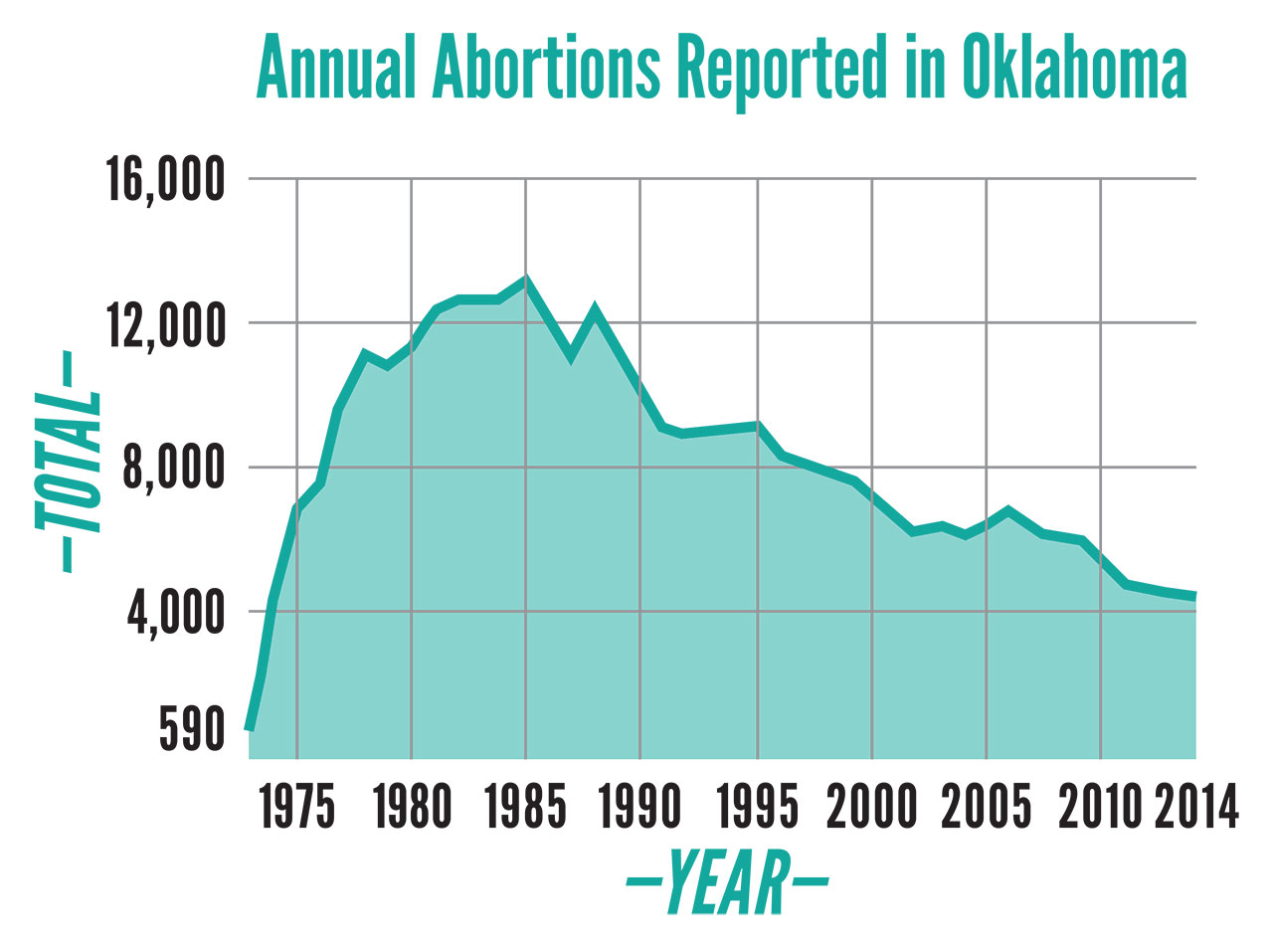
The data on Oklahoma abortions provided by the Oklahoma State Deparement of Health (OSDH). Data prior to 2002 was unavailable from the OSDH; the source of the data prior to 2002 was from the Guttmacher Institute in all the years data was available dating back to 1973.
Pregnancy Centers Up, Abortion Clinics Down
In addition to events, pro-life Oklahomans have worked to meet people at the point of need through faith-based pregnancy resource centers (formerly known as crisis pregnancy centers).
Oklahoma Baptists took a leading role in 1986, serving women and men in the midst of an unplanned pregnancy through the establishment of the Crisis Pregnancy Center. The ministry, which was later taken on by Oklahoma Baptists Homes for Children, has grown and flourished into the Hope Pregnancy Ministries. Today, Hope has clinics in Tulsa, two in Oklahoma City, Ardmore and has plans to add a new Hope center in Edmond.
Today, there are 35 evangelical Christian pregnancy resource centers in Oklahoma, according to the Pregnancy Resource Network of Oklahoma, with multiple Catholic centers as well, compared to only four Planned Parenthood locations.
Even while the number of pregnancy resource centers is increasing, the number of abortion providers is decreasing. According to Health Department sources, “in 2011, there were five abortion providers in Oklahoma; three of those were clinics.” Today, there are two.
While the number of abortion clinics is decreasing, the widespread availability of chemical abortions, including abortion-inducing medication as well as abortion-causing “contraception” are available at pharmacies.
Russell D. Moore, president of the Ethics & Religious Liberty Commission of the Southern Baptist Convention, recently said he is concerned the “the whole issue (of abortion) may be changed soon ‘by technology’—that is, chemically-induced abortions may soon become the norm, with abortion clinics no longer the focal point of the debate.”
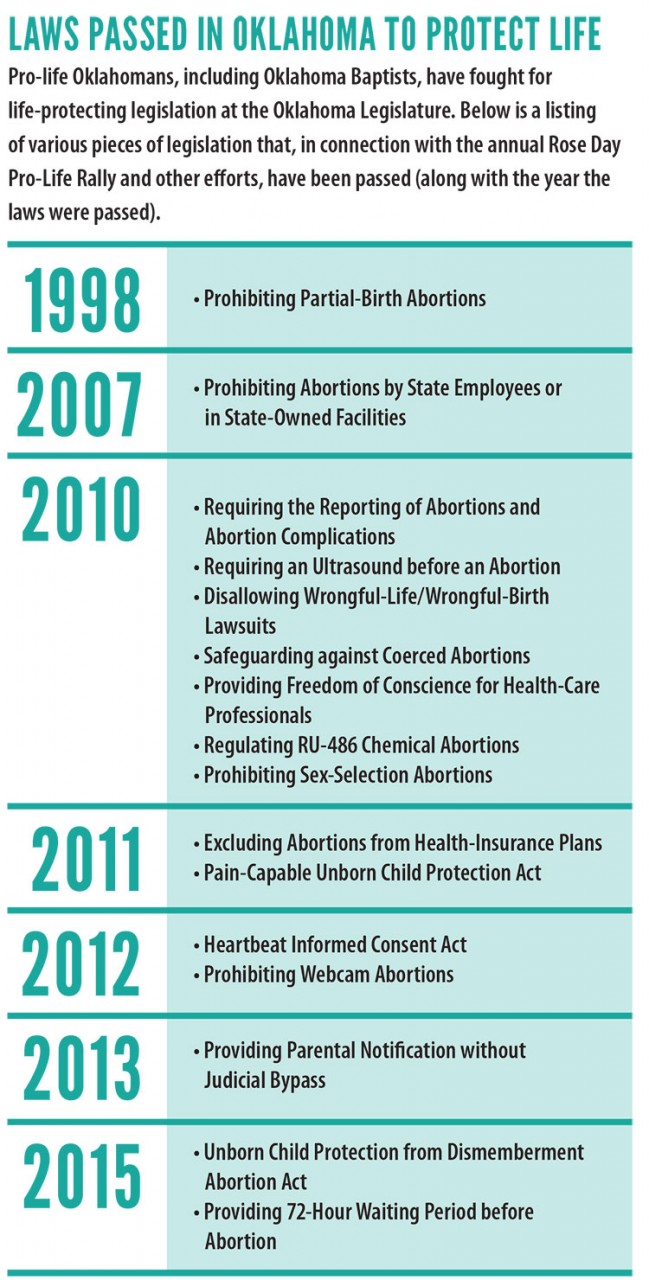
Information concerning state laws passed to protect the unborn was provided by Oklahomans for Life. Some laws later were struck down by the Oklahoma Supreme Court.
Pro-Life Laws
Voices calling for laws to protect the unborn have been heard in Oklahoma. Tony Lauinger first worked on his pro-life bill in 1978.
“Because of a particular provision in a major pro-life bill which we urged the legislature to pass in 1978, Oklahoma law prohibits fetal tissue research (what Planned Parenthood has been criticized as doing),” said Lauinger, who is a leading member of the Rose Day Committee, state chairman of Oklahomans for Life and vice president of National Right to Life. “Fighting for the unborn child has been very challenging through the years, and there have been many legislative obstacles.”
Prior to legislative term limits taking effect in Oklahoma, policies were continually blocked by key members of the Legislature. Due to new legislative leadership and the efforts of Oklahoma Baptists, Oklahomans for Life, Rose Day attendees and others, major pro-life laws have been passed in Oklahoma in recent years.
These laws include a ban on partial-birth abortion, a ban on dismemberment abortion and informed consent laws (see below for a complete list).
Americans United for Life has taken note of Oklahoma’s surge of life-protecting laws, making Oklahoma near the top of its “Life List” state-by-state rankings, which is an index that rates states based on the legislative advances that protect unborn life. This year, Oklahoma is ranked number four, behind Louisiana, Mississippi and Kansas.
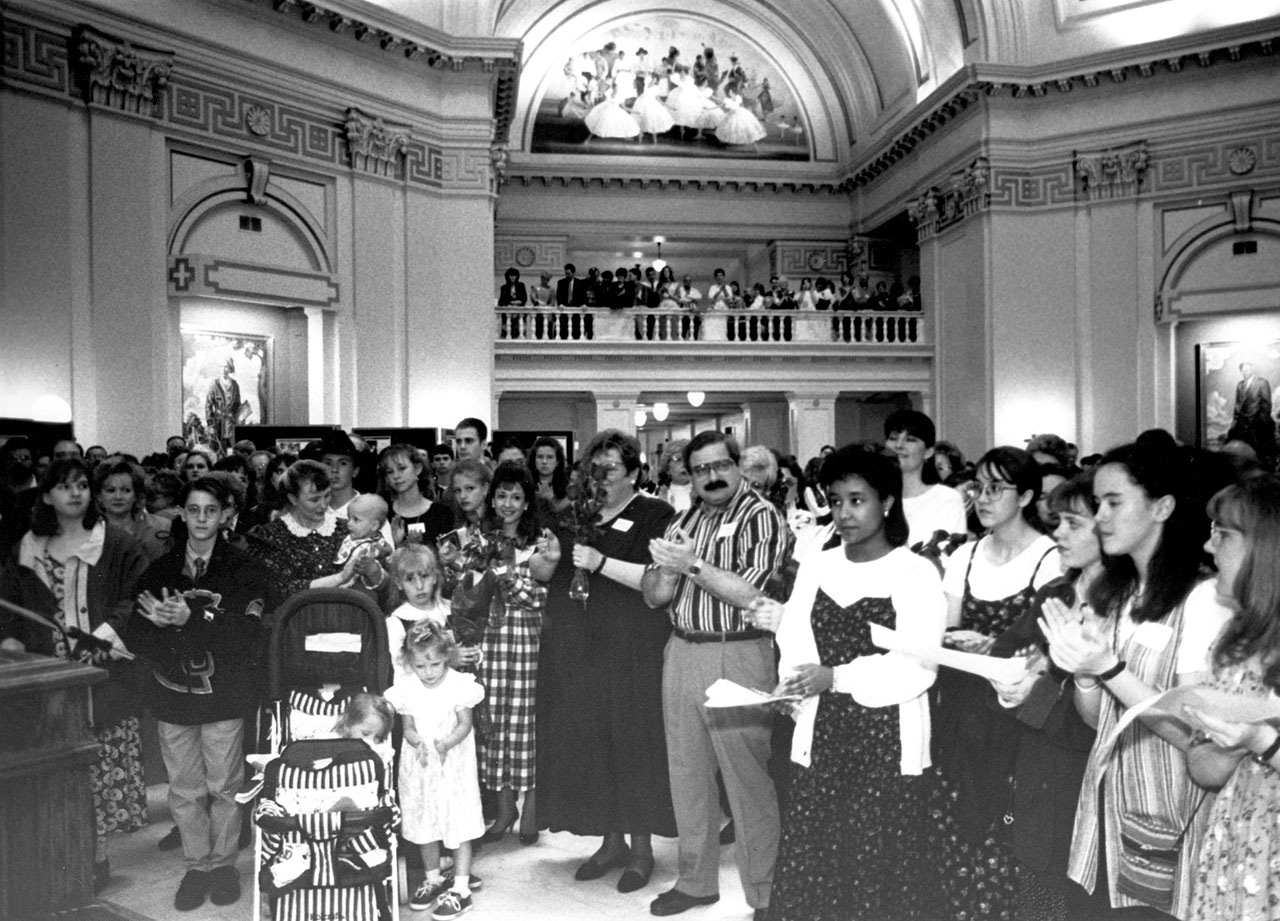
Rose Day Rally attendees filled the Oklahoma State Capitol Rotunda in 1995.
Court Setbacks and Challenges
According to Lauinger, though, some of these laws were blocked, challenged or tossed out by the courts.
“The Oklahoma Supreme Court consistently goes out of its way to strike down pro-life laws,” said Lauinger. “Effectively, the Oklahoma Supreme Court has given the ‘death penalty’ to numerous pro-life laws and to the will of the large majority of Oklahoma voters and legislators who support such laws.”
On Nov. 4, 2014, in Burns v. Cline, 2014 OK 90, the Oklahoma Supreme Court overturned and issued an injunction against Senate Bill 1848, which would require abortionists to have admitting privileges at a local hospital.
In Oklahoma Coalition for Reproductive Justice v. Cline II, on Nov. 4, 2014, the Oklahoma Supreme Court issued a court injunction against the RU-486 bill.
In June 2012, in Nova Health Systems v. Pruitt the State Supreme Court “struck down a modest statute requiring an ultrasound before an abortion could be performed, on the specious grounds that the U.S. Supreme Court’s 1992 Casey decision forbade such statutes, when in fact the Casey decision explicitly allows such regulations regarding abortion,” said Lauinger. “A virtually identical law in Texas was upheld by the federal 5th Circuit Court of Appeals. A mother who sees an ultrasound of her baby is 80 percent less likely to have an abortion. Babies are dying every day in Oklahoma because the state Supreme Court struck this law.”
According to Lauinger, other pro-life laws in 2010, 2012 and 2013, were invalidated by the Oklahoma State Supreme Court, whose members are nominated by the Judicial Nominating Commission, rather than by direct appointment by the Governor or by election. Efforts to reform the judiciary will reportedly be a major focus in the 2016 Legislative session, and many grassroots groups are calling for members of the Oklahoma State Supreme Court not to be retained, citing controversial rulings including these and the ruling to remove a 10 Commandments monument from State Capitol grounds.
Other Key Pro-Life Efforts
Internet videos debuted this summer, exposing Planned Parenthood Federation of America’s practice of harvesting and trafficking tissue and body parts of aborted children. Sparked by that series of videos produced by the Center for Medical Progress, a federal effort to eliminate taxpayer funding has emerged, and a U.S. House investigation of Planned Parenthood was undertaken.
The U.S. Congress has yet to pass a bill that would redirect funds from Planned Parenthood, which receives a reported $500 million annually. In September, Jordan called on Oklahoma Baptists to get directly involved in the cause, asking legislators to defund Planned Parenthood.
He said, “With each new video, the lens cover is being removed. The videos show doctors, employees of Planned Parenthood and clinic employees as they harvest body parts to be sold. Planned Parenthood and the pro-abortion crowd can no longer hide in the dark. The deeds of evil have now been put on graphic display for the world to see.”
He continued, “I am calling on every Oklahoma Baptist to contact their Senators, Congressmen, and the President. Our message is simple and clear. Defund Planned Parenthood now! Nothing else needs to be said!”
U.S. Sen. James Lankford of Oklahoma has been a leading voice in the effort to defund Planned Parenthood, which continues to this day.
Lankford recently spoke at a major “Protect Life and Marriage Rally” on Sun., Oct. 25, at the Oklahoma State Capitol.
“How do we honor life, what God has created? How do we step out and set the example?” Lankford asked. “I would challenge you in several ways. One is in every conversation with every person (say) ‘We are not angry. We are protecting children. We are on the right side of this.’ In every conversation we can have with every person ask a simple question, ‘When is a child a child?’”
Lankford’s call to engage people’s hearts and minds on the issue of abortion is a growing sentiment. Jordan and the BGCO are creating resources for pastors, including sermon outlines and audio files, in preparation for the annual Sanctity of Human Life Sunday (set for Jan. 17, 2016). The effort is to better equip pastors to preach on the topic of abortion.
The ERLC and Moore, who has called on more Southern Baptists to become involved in the pro-life movement, has joined with Focus on the Family to plan a special event in Washington, D.C. called “Evangelicals for Life,” special events will be held Jan. 21-22, 2016, in connection to the annual March for Life in Washington. For more information, visit www.erlc.com.
Moore has said, “I pray that my grandchildren and great-grandchildren will grow up in an age when abortion is not just illegal, but unthinkable.”
To that end of making abortion illegal and unthinkable, there is every indication that an increasing number of Oklahoma Baptists will find ways to stand up for the unborn.


